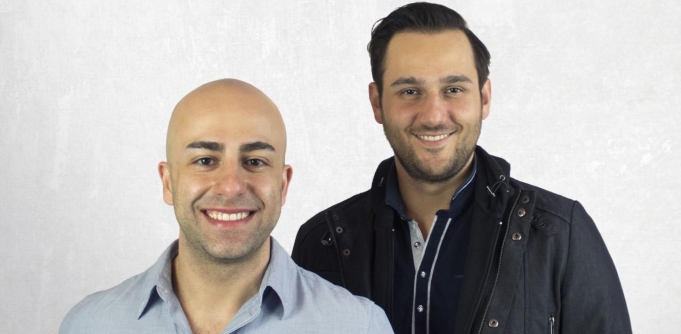
Bluedot Founders Emil Davityan and Filip Eldic. Source: Supplied.
Adelaide-based startup Bluedot has landed a partnership with $26 billion Australian corporate Transurban to launch an app that tracks drivers’ toll road use through advanced location services technology.
Bluedot was founded in 2012 by Filip Eldic and Emil Davityan with an original vision to build the world’s first mobile tolling platform off the back of modern-day smartphone technology.
But speaking to StartupSmart, Eldic says the team quickly realised the original goal was out of reach, due to restrictions on the accuracy and sustainability of using things like location services and other solutions.
“At the time we realised there was no tech out there that could support what we wanted to do. While the initial goal was to build a tolling platform, we realised as a small startup that was a very difficult proposition,” he says.
“So we decided to expand our horizons to a number of other areas, and we went from building a solution to powering a number of other solutions.”
Focused on location tech in general, Bluedot landed a string of high-profile clients including Salesforce, Oracle, and Adobe, continuing to develop their technology. Eldic says the company began to realise it could use all possible sensors on a smartphone in a “reactive” way in conjunction with a form of location tracking known as geofencing to significantly increase accuracy.
“The general accuracy for geofencing is within about 100 meters, and with our tech, we got that 20 times more accurate,” Eldic says.
This increased functionality ended up leading to the startup fulfilling its original dream by landing a partnership with Transurban to develop the new LinktGO app, which is currently live for all Australian toll roads. The app allows customers to enter their phone and license numbers and “seamlessly” use toll roads.
Eldic said Transurban was already exploring the concept of bringing toll functionality closer to customers through options like mobile tech, and the two companies were put in contact through mutual advisors.
“They set up a chat with us and Transurban, and we explained our vision and they said it was exactly what they were looking for. It was very serendipitous,” he says.
“We are excited to use cutting-edge technology in developing Australia’s first GPS-enabled smartphone app that will help occasional users of toll roads. LinktGO provides people with an easy way to monitor and pay for tolls trip by trip on their phone,” Chris Jackson, general manager of customer experience at Transurban said in a statement.
Working with corporates
It took around two years for the partnership to go from concept to app, and Eldic says a slower approach is one of the first things Bluedot had to get used to when working with corporates.
As a startup, the whole experience of working with much larger companies is “quite different”, he says.
“We’ve worked with a few other corporates around Australia, and while we’ve never had a bad experience, we have felt the friction in terms of a mentality difference,” he says.
“It’s mainly the mentality around risk. Startups live and breathe risk on a daily basis and need to be comfortable with uncertainty, but corporations think only about ways to reduce risk and risk management, so the difference can be problematic.”
But working with Transurban has been a different experience, says Eldic, saying the company is “quite innovative” and willing to go beyond typical corporates and was a “rare example” of an Australian corporation willing to take on risks.
Eldic believes more should be done to encourage marriages between startups and corporates, saying a symbiotic relationship between the two can go a long way to benefitting both in terms of learnings, innovation, and access to market.
For startups looking to land deals with corporates, Eldic says it’s important to find yourself an advocate within the corporate to support your vision, saying it’s essential to have a “human face” to vouch for the startup within the company.
“That enthusiasm then spreads throughout the company,” he explains.
“And for a counterpoint, startups need to be prepared for corporate partnerships to be a commitment. Startups might want deals across the line quickly, but if you want to work with corporates you have to have a bit of faith.”
“Our partnership with Transurban has been an amazing proof point, and it’s validated everything we’ve done from the get-go.”
Follow StartupSmart on Facebook, Twitter, LinkedIn and iTunes.


COMMENTS
SmartCompany is committed to hosting lively discussions. Help us keep the conversation useful, interesting and welcoming. We aim to publish comments quickly in the interest of promoting robust conversation, but we’re a small team and we deploy filters to protect against legal risk. Occasionally your comment may be held up while it is being reviewed, but we’re working as fast as we can to keep the conversation rolling.
The SmartCompany comment section is members-only content. Please subscribe to leave a comment.
The SmartCompany comment section is members-only content. Please login to leave a comment.